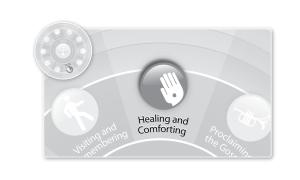Part IX of our series on Healing and Comforting
 We are continuing our focus on hearing and doing the Work of Mercy of healing and comforting. And you may be surprised where that focus takes us today: to the subject of fixed-hour prayer—that is, praying specific prayers at specific hours every day.
We are continuing our focus on hearing and doing the Work of Mercy of healing and comforting. And you may be surprised where that focus takes us today: to the subject of fixed-hour prayer—that is, praying specific prayers at specific hours every day.
What does that have to do with healing? Prepare to be very surprised!
You may be surprised that we’re even talking about fixed hour prayers at all. After all, praying at several set times throughout the day every day is something that today we may associate primarily with Muslims. But it was a core part of not only Jewish practice at the time of Jesus but Christian practice as well, from the birth of our faith on through the middle ages. Here’s an extremely helpful excerpt from The Divine Hours: Prayers for Summertime by Phyllis Tickle:
Centuries before the birth of Jesus of Nazareth, the Hebrew psalmist wrote that “Seven times a day do I praise you” (Ps. 119:164)….
By the beginning of the common era, Judaism and its adherents, already thoroughly accustomed to fixed hours for prayer, were scattered across the Roman Empire. It was an empire whose efficiency and commerce depended in no small part upon the orderly and organized conduct of each business day. In the cities of the Empire, the forum bell rang the beginning of that day at six o’clock each morning (prime or “first” hour); noted the day’s progress by striking again at nine o’clock (terce or third hour); sounded the lunch break at noon (sext or sixth hour); called citizens back to work by striking at three o’clock (none or ninth hour); and closed the day’s markets by sounding again at six o’clock in the afternoon (vespers or evening hour).
Every part of daily life within Roman culture eventually came, to some greater or lesser extent, to be ordered by the ringing of the forum bells, including Jewish prayer and, by natural extension, Christian prayer as well. The first detailed miracle of the apostolic Church, the healing of the lame man on the Temple steps by Sts. Peter and John (Acts 3:1), occurred when and where it did because two devout Jews (who did not yet know they were Christians as such) were on their way to ninth-hour (three o’clock) prayers. Not many years later, one of the great defining events of Christianity—St. Peter’s vision of the descending sheet filled with both clean and unclean animals—was to occur at noon on a rooftop because he had gone there to observe the sixth-hour prayers….
Such readiness to accommodate circumstance was to become a characteristic of fixed-hour prayer. So too were some of the words Peter must have used. We know, for instance, that from its very earliest days, the Christian community incorporated the Psalms in their prayers (Acts 4:23–30); and the Psalter has remained as the living core of the daily offices ever since….
We know from their writings that by the second and third centuries the great Fathers of the Church—Clement (c. 150–215 a.d.), Origen (c. 185–254 a.d.), Tertullian (c. 160–225 a.d.), etc.—assumed as normative the observance of prayers in the morning and at night as well as the so-called “little hours” of terce, sext, and none…or in modern parlance, nine a.m., noon, and three p.m. These daily prayers were often said or observed alone, though they could be offered by families or in small groups.
Regardless of whether or not the fixed-hour prayers were said alone or in community, however, they were never individualistic in nature. Rather, they employed the time-honored and time-polished prayers and recitations of the faith. Every Christian was to observe the prayers; none was empowered to create them.
So Christians prayed “fixed prayers” (i.e., actual psalms from the Bible rather than their own extemporaneous prayers) at each of the major “turns” in the standard work day—the start of the day, the third hour, lunchtime, the ninth hour, and the close of the work day.
This brings up two questions that we can ponder over the weekend:
1. Why might Christians have prayed psalms and other Scriptures rather than their own extemporaneous prayers during their fixed hour prayer time?
2. Why did Christians—from Jesus on through the Apostles on through the Middle Ages—pray at specific hours throughout the day?
What do you think?










